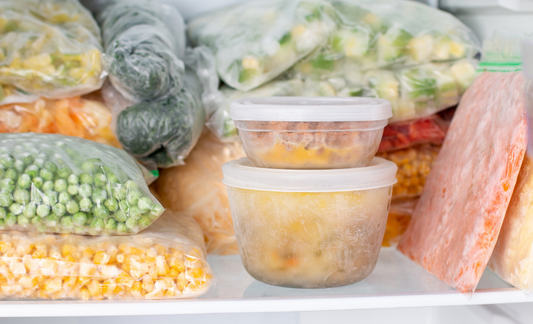Help Isom IGA recover from devasting floods

When you hear the words "sustainable", "eco-friendly" or "green", odds are the first thing to pop in your head isn't going to be groceries. But what if I told you that learning to shop more sustainably at the grocery store is a great place to start if you're working toward a more sustainable lifestyle? That's right, did you know that 30 to 40 percent of the U.S. food supply is wasted, meaning it goes uneaten? The good news it, this is an easy fix if we're all willing to make little changes to our grocery shopping routines.
We can all contribute to the cause for a more sustainable earth in our own small personal ways. And incorporating the habit of sustainable grocery shopping can be your start towards ensuring a more greener earth and clearer skies for the future generations to come.
How to go about sustainable grocery shopping?
Use sustainable shopping bags
Use of sustainable shopping bags is the simplest and the easiest way to start your sustainable grocery shopping routine. Before you step out of your house for grocery shopping remember to take your reusable bags with you. By following this ‘bring your own bag’ custom, not only will you save the time and inconvenience caused by packaging but more importantly decrease the use of plastic bags. In case you happen to forget to bring your reusable bags, choose paper bags or any other form of sustainable bags.
Shop local, think global
Now that we have got the reusable bags out of the way, buying local food products over imported ones has a very reaching global effect. Not only will the purchase of local products help boost the local economy, but in the big picture the more we rely on local products, the less will be the need to transport food items. Which ultimately leads to the decrease in greenhouse gas emission and other various pollutants emitted by transportation vehicles.
So, shop locally to have a global impact.
Moreover, local organic food is healthier and tastes better than the ones that are packaged and transported over countries or state lines. Farmer’s market offers the best option for the shopping of local food products.
Reduce your food waste
The reduction of your food waste starts from your shopping list. So before stepping out for grocery shopping with your reusable bags, make sure that your shopping list has more of the items that you need, and less of the items that you want. This will not just economize your grocery shopping, but also prevent wastage of food. For instance, you by a product which you think you want, and after getting home realize what a waste it was buying it.
Once you get home after your grocery shopping, ensure that you store your degradable food items properly to prevent and reduce spoilage.
Shop less meat, but better meat
Reducing your consumption of meat is another way of cutting down on your footprint. The amount of work and labor that goes into the production of meat, is another major element that contributes to the emission of greenhouse gases and consequently global warming. And killing animals for food is in a way, inhumane.
So, the next time you venture out for your weekly grocery shopping remember to shop for less meat, but good meat.
Understanding food labels
Most grocery items nowadays come with labels whether they be there for advertisement or to provide you with the information about the food. Information like – 100% organic, all natural and healthy, 100% pure and so and so forth. The point being most of these food items are there to be sold, and what gets sold becomes of more importance than what actually is being sold. So, while doing grocery shopping it becomes imperative to understand these labels and always try to go for the ones with genuine certifications.
And also, always check the expiration date of any giving item before putting it away in your sustainable grocery bag.
Look for environmentally-friendly packaged foods
Unfortunately, we live in a day and age where the most food that we consume is packaged in one form or the other. And invariably, plastics are used to package the food item. So, the chain of events of packaged food goes something like this – the more packaged foods we buy, the more its demand grows, and with it goes up the demand for the material needed for packaging that is plastics. In the end we are left with more and more plastic waste, than the amount which is being recycled.
This problem can be more vividly seen, and more acutely felt in developing and third world countries.
So next time, while you are grocery shopping try and keep your purchase of packaged foods as minimum as possible.
To round off this section on how to go about sustainable grocery shopping here are some additional tips for more intelligent grocery shopping.
- Try to refrain from over shopping for perishable food items.
- Make a shift from meat-based food towards plant-based food.
- Opt for the recycling of your plastic waste.
- Once in a while go for a bulk grocery shopping spree.
You May Also Like
These Stories on Better Choices
Oct 21, 2022 1:16:33 PM |
2 min read
Oct 19, 2022 10:43:00 AM |
4 min read


